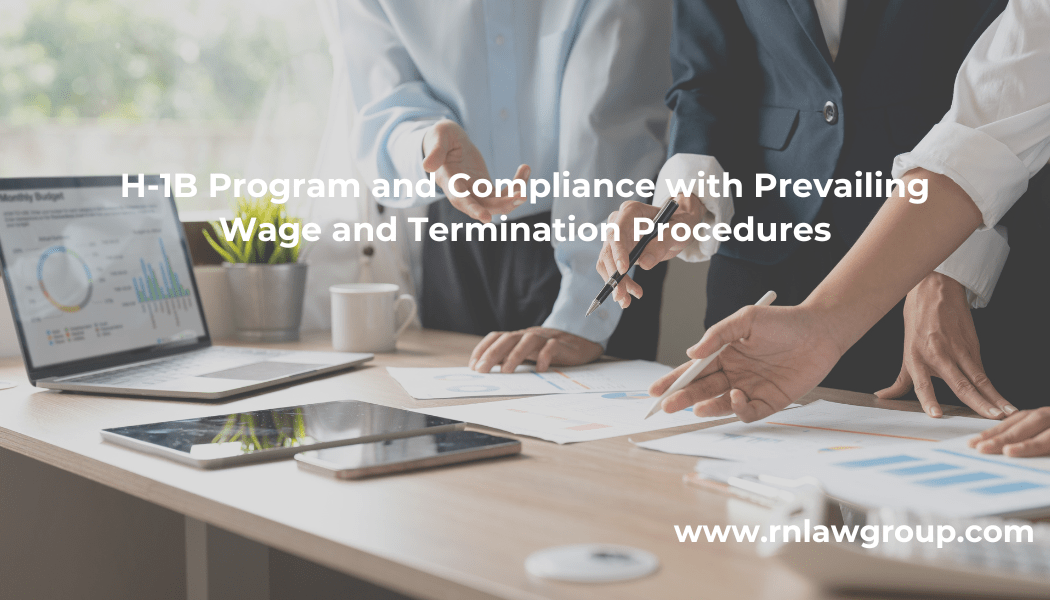
H-1B Program and Compliance with Prevailing Wage and Termination Procedures
Navigating the H-1B visa program requires employers to adhere to a complex framework of federal regulations designed to protect both foreign workers and the U.S. labor market. Key among these requirements are the obligations to pay the prevailing wage and properly manage the termination of H-1B employees. Failure to comply with these rules can expose employers to substantial legal and financial risks, including government audits, penalties, and damage to their reputation. This article outlines the critical compliance obligations regarding wage payments and termination procedures, highlights the consequences of noncompliance, and offers best practices for employers to mitigate these risks.
Prevailing Wage Requirements and Legal Risks of Underpayment
One of the most fundamental obligations is the requirement to pay H-1B workers the prevailing wage as stated in the certified Labor Condition Application (LCA) throughout the duration of their employment. Failing to meet this requirement can result in significant penalties if the Department of Labor (DOL) decides to initiate an audit or is alerted through a complaint from a former employee.
The prevailing wage is the minimum compensation level established by the Department of Labor based on the job duties and geographic location. Employers must ensure that H-1B workers are paid at least this amount for the entire duration of their employment. Underpaying an H-1B worker, even unintentionally, constitutes a violation of the Labor Condition Application (LCA) and exposes the employer to legal liability. If the Department of Labor initiates an investigation, employers may be required to pay back wages, face civil fines, and, in some cases, be temporarily barred from participating in the H-1B program.
Termination Procedures and Continued Liability
In addition to wage compliance, employers have specific responsibilities when terminating an H-1B worker. A formal termination by the employer must include a written notice to the employee and an offer to pay for reasonable return transportation to the employee’s home country. More importantly, regardless of how the employment relationship ends, the employer must notify USCIS of the end of the employment relationship and officially withdraw the H-1B approval. Until these steps are completed, the employer remains legally responsible for the employee’s wages, regardless of whether the individual continues to report to work.
Consider a situation in which an H-1B employee stops reporting to work without providing a formal resignation. Uncertain about the employee’s status, the employer assumes the individual has voluntarily left the position and takes no further action. However, without submitting a formal request to withdraw the H-1B petition with USCIS, the petition remains active. Months later, after a complaint from a different employee, the Department of Labor initiates an investigation and concludes that the employer failed to properly notify USCIS of the end of the employment relationship. Because the petition was still valid as USCIS had not been notified, the employer is held liable for back wages covering the entire period, even though the employee had already left the country. This liability could have been avoided with a timely and formal withdrawal of the H-1B petition.
Department of Labor Investigations and Penalties
DOL audits and site visits may occur as part of a routine compliance review or in response to a single employee complaint. During these reviews, the DOL may examine payroll records, LCA documentation, and employment practices related to all H-1B workers within the organization. This scrutiny can reveal broader compliance issues, elevate the severity of penalties, and cause lasting reputational damage.
Civil penalties can range from several hundred dollars to as much as $67,367 per violation, depending on the specific circumstances of the violation. In serious cases, employers may also face debarment from the H-1B program, preventing them from sponsoring or employing H-1B workers in the future. If the DOL concludes that wage underpayment or failure to withdraw petitions was systemic or intentional, or that U.S. workers were adversely affected, the consequences are likely to be more severe.
Best Practices for Compliance
To minimize these risks, employers should maintain robust compliance practices. These should include ensuring accurate and timely wage payments, regularly auditing payroll records against the salary requirements specified in the H-1B petition, and promptly withdrawing H-1B petitions upon the conclusion of employment. Proactive compliance is not only a legal obligation but also essential for protecting the business and maintaining employee confidence.
By: Adena Bowman
Adena Bowman is a Senior Associate Attorney at Reddy Neumann Brown PC with over 12 years of experience in U.S. immigration law. She helps clients ranging from small businesses to large multinational corporations bring workers to the U.S. and stay compliant with immigration regulations. She also guides individual clients through employment, investment, and family-based immigration matters. Clients rely on her for clear guidance, strategic planning, and personalized support in navigating complex immigration challenges.

